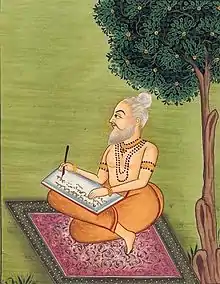蚁垤
蟻垤(梵語:; [ʋɑːlmiːki],?—?),又音譯跋彌,是一位古印度梵语文学的先驅者诗人[1]。相傳是公元前5世紀左右[2][3]到前一世紀[4]的作品《罗摩衍那》的作者[5],其身份不詳,有很多傳說,有人說是語法學家,或古代仙人。
蚁垤 | |
|---|---|
 正在写《罗摩衍那》的智者蟻垤 | |
| 个人资料 | |
| 宗教信仰 | 印度教 |
| 父母 |
|
| 荣誉 |
|
相傳蟻垤出身婆羅門家庭,因靜坐修行數年不動,身上成了螞蟻窩的小土丘,故以蟻垤為名。另一種說法原本是個棄兒,被山中野人收養。長大成家後,以偷盜為生,專門搶劫朝聖者,後來被一位瑜伽士開導。一般專家傾向《羅摩衍那》是漫長歷史累積的產物,由歷代宮廷歌手和民間詩人不斷添加擴充,直至最後定型。蟻垤有可能是史詩原始形式的“最初的詩人”,也可能只是一位虛構的作者。
參考資料
- . Institute for Sustainable Development. 2000: 479. ISBN 978-81-261-0655-4 (英语).
- . The Guardian. 2008-08-23 [2015-04-27]. (原始内容存档于2013-09-02).
第三段:"Dating in its current form from around the middle of the first millennium BC, it is traditionally credited to the sage Valmiki, who is said to have invented the sloka form (stanzas of two lines, each with 16 syllables) while writing it."
- Pattanaik, Devdutt. . mumbaimirror. 2020-08-08 [2021-11-20]. (原始内容存档于2020-08-14) (英语).
- (PDF). uwf.edu. University of West Florida: 2. [27 April 2015]. (原始内容存档 (PDF)于2015-04-17).
read end paragraph of page 2
- Valmiki, Robert P. Goldman.
 1. Princeton University Press. 1990: 14–15. ISBN 0-691-01485-X.
1. Princeton University Press. 1990: 14–15. ISBN 0-691-01485-X.
This article is issued from Wikipedia. The text is licensed under Creative Commons - Attribution - Sharealike. Additional terms may apply for the media files.